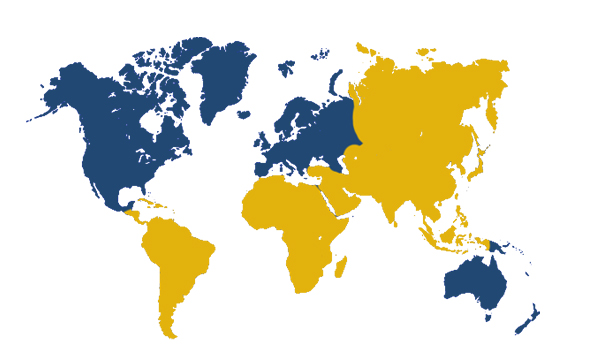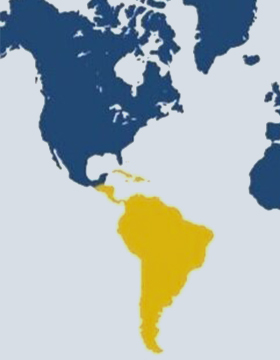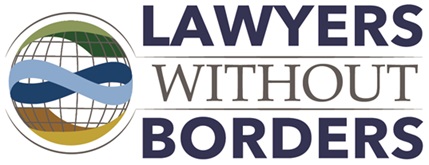Where We Work
LWOB has past and current projects in Africa, Asia, Caribbean, Central and South America.

Africa

The COVID-19 pandemic presents unique uncertainties for long-term program planning and operations. LWOB has already leveraged its experience in delivering programming through virtual platforms. Training presentations have been pre-recorded and distributed to participants accompanied by knowledge tests to assess learning. Discussion forums and group exercises have been held virtually or facilitated by domestic experts in collaboration with the project team. In line with its “do no harm obligations,” LWOB will follow the health and travel advisories issued by the US Center for Disease Control and World Health Organization. If and when convening meetings, the project team will ensure the venue employs adequate sanitation practices and call upon participants to adopt good practices such as regular hand-washing and wearing face masks to reduce the risk of infection. Training set-ups will be adapted to reduce the risk of transmission, including providing hand sanitizer, minimizing direct contact, and instituting socially distanced seating arrangements. The project team will continue to monitor the COVID-19 situation closely, including its impact of institutional morale and political will for program objectives.
Burkina Faso
In 2010, the Burkinabe Government studied child labor practices in the mining sector in five regions of Burkina Faso. The study concluded that one-third of the population on the artisanal gold-washing sites were children. In 2017, LWOB followed up the study with a legislative report analyzing Burkinabe child labor laws to identify gaps under specific child labor International Labor Conventions. The analysis concluded with suggested amendments to Burkina Faso’s national legislation on child labor and included additional related policy recommendations.
Ghana
LWOB conducted a three-day training program for Ghanaian judges and magistrates in 2012 at the Judicial Training Institute in Accra, Ghana. The goal of the program was to provide judicial support practices to judges and magistrates in the areas of family law and juvenile justice by teaching effective judicial practices. Interactive presentations included judicial ethics, evidentiary and special challenges as well as assessing the credibility and best interests of the child. The program was attended by 18 Circuit Court judges and magistrates from the greater Accra area assigned to the Family and Juvenile Courts.
Kenya
WILDLIFE CRIMES
LWOB went to Kenya in 2015 to implement the two-year PROTECT project (Prosecution, Outreach, Trial: Enforcement Chain Training) with the goal of reducing the threat to wildlife by improving legal culture for investigation and prosecution of wildlife under the Kenyan Wildlife Act. Trainings covered the investigation, arrest, charge, and trial for a Wildlife Act related crime. In addition to judges and public prosecutors from the Office of the Director of Public Prosecutions (ODPP), the training programs included officers from the Kenya Wildlife Service (KWS) whose responsibilities include investigating and prosecuting wildlife crimes. The training modules for the wildlife officers were in short segmented sessions to minimize interruption to the officers’ work day in the field. Thereafter, the KWS wildlife officers who had been trained went on to train 166 more officers.
In 2018, LWOB launched a two-year WICRI Project (Wildlife Crime Mock Trial Information) in both Tanzania & Kenya to improve the capacity to prosecute complex wildlife trafficking cases through a series of trial advocacy trainings in each country. The trainings focused on the criminal prosecution of wildlife crimes, along with the attendant crimes of money-laundering, corruption and fraud. LWOB conducted four trial advocacy trainings, during which LWOB identified the top 30 participants in each country to participate in later domestic mock trial competitions. In early 2020, LWOB held its domestic mock trial scrimmages in Kenya that consisted of two scrimmages and two training days. A total of 28 attorneys attended the scrimmage and were trained on the status of the international fight against the ivory trade, local laws dealing with anti-corruption, bribery, and fraud, as well as trial advocacy skills on impeaching a witness and learning how to flip a witness. The training also featured review sessions on objections, export and import laws, written submissions, and presentation skills. WICRI provided 24 days of training for 388 participants. Following the final training in Kenya, LWOB started logistical preparations for the mock trial competitions in both countries. However, COVID-19 interrupted preparations and the mock trial competitions were postponed. In the interim, LWOB is researching the impact of the virus on prosecuting wildlife crimes and researching remote learning technologies in case travel is not possible for an extended period of time.
FORCED LABOR
In 2019, LWOB participated in an on-going subgrant with Verité Inc. entitled “The Promoting Safe and Fair Migration from Kenya to the Gulf State Project.” The project focused on forced foreign labor and illegal labor recruitment. In November, LWOB, in coordination with the Counter Trafficking in Persons Secretariat, hosted its first workshop in Nairobi, Kenya, to develop a set of standard operating procedures (SOPs) to investigate and prosecute illegal labor recruitment offences. LWOB will host a second workshop in 2020.
PROSECUTOR’S TRAINING INSTITUTE FOCUSED ON COUNTER-TERRORISM
The CESTI Project (Collaborative to Establish a Training Institute) was launched in Nairobi, Kenya in September 2017 with the goal of developing a Public Prosecutor Training Institute (PTI) focused on substantive counter-terrorism trial advocacy issues. LWOB in partnership with PTI has since conducted seven Training of Trainers (TOT) programs and five Training of Prosecutors (TOP) programs. The final training in early 2020 focused on Money Laundering, Case Management, Plea Bargaining, Admitting Evidence. LWOB continues to work with PTI to deliver teaching manuals and provide management software tools.
Liberia
HUMAN TRAFFICKING
Since the 14-year civil war ended in Liberia in 2003, Liberia has made significant progress towards securing infrastructure reconstruction and development. LWOB went to Liberia in 2007 with its first Trial Advocacy Training program. When LWOB arrived, Liberian courts had not yet prosecuted a single human trafficking case. In 2016, LWOB completed its four-year Liberia Human Trafficking Program that included two week-long Trial Advocacy Training Programs, several eTrainings (due to the Ebola crisis) and distribution of eLearning materials, educational board games and graphic novels. The project aimed to promote the rule of law and strengthen Liberia’s overall capacity to identify, investigate, and prosecute human trafficking. Trainees included magistrates, prosecutors, public defenders, law enforcement officers, NGO lawyers and government officials. Thomson Reuters donated eLearning portals which ensured program sustainability.
CHILD LABOR LAWS
The Ebola crisis landed a devastating blow to Liberia in 2014 and 2015 that significantly impacted children who had been orphaned because of the deadly disease that plagued families everywhere. As part of its ongoing work in the child labor area, LWOB and its partners conducted comprehensive assessments of the child labor laws that were in place in Liberia, analyzed relevant international agreements, and drafted materials to educate Liberians about the gravity of child labor problems and the importance of designing child labor laws that were consistent with current international standards.
LIBERIA CASE LAW DIGEST AND INDEX
The Liberia Case Law Digest Project was launched in 2008. Out pro bono law firm partner, Linklaters LLP, assumed the huge task of summarizing and indexing over 10,000 cases spanning Liberia’s legal history. The creation of the legal index and digest of Liberia’s case law contributed to the rebuilding of Liberia’s judicial system that had been shattered following the country’s two civil wars. The project of updating the index and digest continues with the generous pro bono and in-kind support from Linklaters and Thomson Reuters.
Namibia
In 2019, LWOB partnered with United Nations Office on Drugs and Crime (UNODC) in a trial advocacy training program in Windhoek, Namibia. The program focused on building capacity among prosecutors through LWOB’s signature Support Through Trial Advocacy Training (STTAT) program. Judge Ann Williams, a former federal judge in the Seventh Circuit, led the training that featured gender violence. LWOB will return to Windhoek in the latter half of 2020 to conduct a wildlife crimes program.
Nigeria
LWOB partnered with the National Institute for Trial Advocacy (NITA) in 2016 in conducting a four-day Trial Advocacy Program for public prosecutors and prosecutors from Lagos. The Nigerian Office of the Public Defender (OPD) hosted the training for 61 people that was led by Judge Ann Williams.
LWOB created a series of graphic novels entitled, Shuga Najia, to reverse the attitudes in Nigeria towards domestic violence. The comic series illustrated the unacceptability of domestic violence and the importance to victims of seeking legal recourse and outside support.
Tanzania
HUMAN TRAFFICKING
LWOB was awarded a three-year grant to conduct a victim-focused human trafficking program in Tanzania. LWOB conducted its first training in 2017 in Dar es Salaam for 78 justice sector participants. LWOB used its Support Through Trial Advocacy Training (STTAT) model for the five-day program. This “learning by doing” methodology provided participants with an opportunity to practice skills in a mock trial setting. The Trafficking in Persons (TIP) training modules focused on the best investigation practices, how to conduct proactive investigations, and how to identify signs that suggested the existence of TIP. Since then, the TIP-TAN program has conducted 15 trainings across 13 regions in Tanzania that strengthened the capacity of stakeholders to investigate, prosecute, and combat human trafficking. Over the past three years, LWOB’s regional trainings increased capacity among magistrates, prosecutors, police officers, immigration officers, social welfare officers, NGOs, and community leaders to coordinate together, and improve the identification, investigation, and prosecution of TIP cases. To date, the TIP-TAN program has trained 362 individuals on topics, including the use of Tanzania’s Anti-Trafficking in Persons Act and the need to ensure a victim-centered approach to investigating and prosecuting human trafficking cases. The grant was extended for two more years in 2019. LWOB wants to increase efforts to raise social awareness of human trafficking and community resilience through a community dialogue project. LWOB will also introduce new training materials on stakeholder collaboration; study the impact of COVID-19 on human trafficking in Tanzania; and introduce new prosecutor and judiciary focused manuals
WILDLIFE CRIMES
In 2017, LWOB received a two-year grant from the State Department (INL), “the Criminal Enhancement and Supporting Enforcement (CEASE),” to improve the criminal justice sector capacity for investigating and prosecuting wildlife crime in Tanzania. LWOB conducted 19 in-country trainings for 348 wildlife crime stakeholders, including 64 judges and magistrates, 72 prosecutors, 143 wildlife officers, 41 police officers, and 28 community leaders and educators. The trainees came from all over Tanzania, representing 77% of its regions, including Mikumi National Park as well as several remote conservation and park areas, such as the Selous Game Reserve and Southern Protected Area. LWOB distributed over 4,000 educational materials created by its pro bono law partners, including a youth-oriented illustrated wildlife alphabet encyclopedia titled “Saving Neema” and a coloring book “Protect, Don’t Poach!” for use in a school curriculum. Four of the trainings focused on LWOB’s train-the-trainer programs.
In 2018, LWOB launched a two-year WICRI Project (Wildlife Crime Mock Trial Information) in Tanzania and Kenya to improve the capacity to prosecute complex wildlife trafficking cases through a series of trial advocacy trainings in each country. The trainings focused on the criminal prosecution of wildlife crimes, along with the attendant crimes of money-laundering, corruption and fraud. LWOB conducted four trial advocacy trainings, during which LWOB identified the top 30 participants in each country to participate in later domestic mock trial competitions. COVID-19 forced the postponement of the mock trial competitions. In the meantime, LWOB is researching the impact of the virus on prosecuting wildlife crimes as well as researching remote learning technologies in case travel is not possible for an extended period of time.
Middle East
In 2015, LWOB created ten educational graphic novels intended for digital viewing for audiences in the Middle East region. The graphic novels were contextualized to a specific country’s culture and life. Each graphic novel addressed one of the top ten human rights’ issues being faced: Press Freedom; Discrimination against minorities (incl. sexual orientation); Women Rights; Executions and Torture; Freedom of Assembly; Imprisonment of Lawyers; Free and Fair Elections.
Asia
Nepal

LWOB and Winrock International launched a multi-country, four-year collaboration in Asia in 2015 to address human trafficking issues that were deeply intertwined with forced child labor. The CLEAR II project was launched in Nepal to combat the labor exploitation of Nepalese children. LWOB conducted a legislative assessment, created an extensive list of policy recommendations and a comprehensive legislative drafting guide with the goal of bringing Nepal’s child labor laws into compliance with international standards on child labor and instruments. One of the final project deliverables was a graphic novel focused on ways to protect children before and after a natural disaster, such as the 2015 earthquake. The graphic novel addressed child registration, identification of safe spaces, and verification of child identity at border crossings.
Thailand
Since 2019, LWOB has been working on a sub agreement under Winrock International in support of the Department of Labor project “Attaining Lasting Change for Better Enforcement of Labor and Criminal Law to Address Child Labor, Forced Labor and Human Trafficking” (the ATLAS Project). LWOB conducted a legislative gap analysis for Thailand and assisted in the research and writing of a Body of Knowledge.
Caribbean,Central & South America

LWOB first started working in the Caribbean in 2007 with a focus on conflict resolution, capacity building and international and national human rights. In 2011, LWOB launched a three-year program in a Caribbean nation that provided essential mediation, consensus building, legal and human rights skills to civil society. The project’s goal was to strengthen civil society organizations (CSOs) by increasing their capacity to resolve and mediate conflicts within and among themselves. LWOB delivered materials and trainings to a diverse cross-section of civil society leaders, independent lawyers, independent journalists, other professionals and independent libraries across the country to help them organize, build and run associations. LWOB further created and distributed a Distance Learning Program (DLP) on human rights topics. During the project’s 3-year life span, LWOB distributed a total of 13,864 materials throughout the country, including 4,103 graphic novels directed to civil society members to increase their general knowledge of mediation concepts, negotiation and legal skills as well as 224 Graphic Novel Teaching Manuals and mediation toolkits.
Belize
Belize ratified all the International Labor Organization (ILO) conventions relevant to child labor but needed to implement these laws into its national framework. As part of its ongoing work in the child labor area, LWOB and its partners conducted comprehensive assessments of the child labor laws currently in place in Belize, analyzed relevant international agreements, and conducted workshops designed to support in-country efforts to harmonize Belize’ child labor laws with current international standards.
Jamaica
LWOB worked with Winrock International on the Jamaica Child Protection Compact (CPC) project whose goal was to improve current procedures in identifying and referring child trafficking victims. LWOB’s gap analysis of the existing standard operating principles (SOPs) was followed by recommendations of key identifiers for early detection of child victims and procedures to refer them to necessary services. The recommendations were presented to stakeholders within the Jamaican government and interested civil society organizations in two workshops in Kingston. At the workshops, representatives from more than ten Jamaican ministries and civil society organizations reviewed LWOB recommendations, made additional edits and suggestions, and built consensus towards how to socialize a more efficient identification and referral process. Following the outbreak of COVID-19, LWOB postponed three regional events planned to introduce new victim identification standards and the national referral system for victim assistance. Most recently, LWOB learned that Jamaica CPC's Child Trafficking Indicators, Screening Tool, and National Referral Mechanism had been officially approved for use by the Jamaican government. These policies were the centerpiece of the team’s work for the past year and a half, involving a multitude of government agencies, international trainers, legislative analysis, negotiation, and patience. They will help make child trafficking victims in Jamaica more visible, safer, and able to receive needed services.
Paraguay
Since 2019, LWOB has been working with Winrock International and Partners of the Americas to implement the U.S. Department of Labor-funded project, ATLAS: Attaining Lasting Change for Better Enforcement of Labor and Criminal Law to Address Child Labor, Forced Labor and Human Trafficking. ATLAS works towards three interrelated outcomes: (1) strengthened labor and/or criminal legal frameworks concerning child labor, forced labor, and/or human trafficking by helping stakeholders gain the authority to act; (2) improved enforcement of labor and/or criminal frameworks by strengthening stakeholders’ capacity to act; and (3) increased coordination among law enforcement and social protection entities, which ensures that stakeholders have the mechanism to be effective. The ATLAS project will include at least four countries over the course of four years. LWOB started its work in Paraguay by conducting a legislative gap analysis of the country’s child labor, forced labor, and human trafficking laws. Virtual trainings and workshops are scheduled to begin by the end of 2020.


